|
|
|
Sort Order |
|
|
|
Items / Page
|
|
|
|
|
|
|
| Srl | Item |
| 1 |
ID:
144284
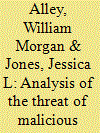

|
|
|
|
|
| Summary/Abstract |
This study seeks to evaluate the threat of malicious chemical use by non-state actors. It finds that non-state actors have primarily turned to ready-to-use crude chemical weapons (CW) instead of traditional CW agents. Interestingly, the worst crude CW attacks have been more destructive than those employing traditional CW. Scenarios for catastrophic consequences exist, but chemical attacks have typically been used to accomplish tactical goals, which leverage psychological and economic impacts. Therefore, successful efforts to counter CW proliferation by non-state actors must be substantially different from those targeting states.
|
|
|
|
|
|
|
|
|
|
|
|
|
|
|
|
| 2 |
ID:
108131
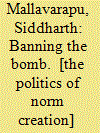

|
|
|
|
|
| Publication |
New Delhi, Pearson, 2007.
|
| Description |
xv, 229p.
|
| Standard Number |
97881131701171, hbk
|
|
|
|
|
|
|
|
|
|
|
|
Copies: C:1/I:0,R:0,Q:0
Circulation
| Accession# | Call# | Current Location | Status | Policy | Location |
| 056330 | 327.174/MAL 056330 | Main | On Shelf | General | |
|
|
|
|
| 3 |
ID:
182999
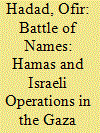

|
|
|
|
|
| Summary/Abstract |
This paper addresses the phenomenon of military operation-naming, that is, the act of giving names to war practices. Based on the four strategies of War Normalizing Discourse theory, I argue that, like nation-states, violent non-state actors also use the tool of naming to disseminate their wartime perceptions and mobilize public opinion for their own interests. Moreover, I argue that in its war-naming efforts the violent non-state actor seeks to defy and undermine the official names of its enemy state, using its own names to expand the physical battlefield to other fields of war and to present itself as an equal and legitimate player. To establish the above arguments, the article presents the case study of Hamas—specifically, the movement’s naming of rounds of fighting against Israel since the beginning of its rule in the Gaza Strip in 2007.
|
|
|
|
|
|
|
|
|
|
|
|
|
|
|
|
| 4 |
ID:
137250
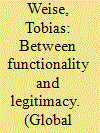

|
|
|
|
|
| Summary/Abstract |
Who should be allowed to participate in intergovernmental organizations? There is a growing debate about the increasing opening of IGOs for nonstate actors. Explanations of this phenomenon either highlight the functional benefits of opening, or the need of opening to maintain or increase organizational legitimacy. This article analyzes how German diplomatic talk frames nonstate participation and refers to functionality or legitimacy when justifying the opening of IGOs. The perspective of diplomats, the main gatekeepers of change in IGOs, has rarely been considered for analysis. This article argues that German diplomatic discourse about opening is mainly functional. There is only limited reference to nonstate participation as an element of IGO legitimacy. Further, there are elements in German diplomatic talk that challenge the legitimacy of nonstate actors.
|
|
|
|
|
|
|
|
|
|
|
|
|
|
|
|
| 5 |
ID:
182961
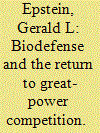

|
|
|
|
|
| Summary/Abstract |
The 2017 US National Security Strategy asserts that, “after being dismissed as a phenomenon of an earlier century, great power competition returned,” pointing to actions that Russia and China have taken to reassert their influence and attempt to change the international order. Such a shift has implications for biodefense. It suggests an increased likelihood of the development and potential use of biological weapons by states, which had been downplayed by those who have been more concerned about non-state biological-weapons programs. State program access to expertise, facilities, and resources implies a greater level of technological sophistication than would typically be credited to non-state actors, influencing the requirements for national biodefense programs to detect, characterize, respond, to, and attribute a biological attack. States also could have missions for biological weapons that differ from those intended by terrorists.
|
|
|
|
|
|
|
|
|
|
|
|
|
|
|
|
| 6 |
ID:
131979
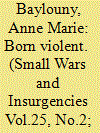

|
|
|
|
|
| Publication |
2014.
|
| Summary/Abstract |
We know little of the internal governing practices of non-state actors once in control of territory. Some territories have witnessed the establishment of new institutions of public goods remarkably similar to state institutions. This article compares four armed political parties governing territory during the Lebanese civil war. These non-state violent actors established complex political and economic institutions and administrative structures. Despite the wide range of ideologies and identities of these actors, they all converged in their institutional priorities, although not in their capacities or the particular ways of achieving those priorities. Data from interviews and the actions of the armed political parties suggest a combination of ideology and desire for control is causal in generating public institutions, partly attributable to the high degree of citizen activism marking the Lebanese case.
|
|
|
|
|
|
|
|
|
|
|
|
|
|
|
|
| 7 |
ID:
172667
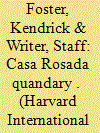

|
|
|
| 8 |
ID:
197671


|
|
|
|
|
| Summary/Abstract |
The security situation in the Sahel region has been deteriorating with a consistent increase in violence. Despite tens of thousands of international troops in the region for over a decade, little headway has been made in establishing government control over the territory. The ongoing multilateral and large-scale military operations in the region have employed a boots-on-the-ground strategy that has been largely ineffective in stamping out the insurgency. The paper advocates for a recalibrated counter-insurgency strategy predicated on drones’ heightened and consistent deployment for counter-insurgency operations in the West African Sahel. This is in response to France's phased withdrawal from the region and the limited effectiveness of current multilateral military endeavours to quell the insurgency. The paper presents two related arguments hinged on the tactical utility of drones, drawing on the concept of ungoverned spaces as a theoretical foundation.
|
|
|
|
|
|
|
|
|
|
|
|
|
|
|
|
| 9 |
ID:
188320
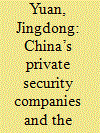

|
|
|
|
|
| Summary/Abstract |
China’s private security companies (PSCs) have become increasingly active actors in meeting the growing demands of Chinese companies operating in high-risk foreign environments for protection and security of both their assets and employees. While growing rapidly in recent decades, Chinese PSCs are relatively new in providing overseas services, remain constrained by lack of well-trained and fully-equipped personnel, and operate under legal uncertainties. Nonetheless, they perform critically important functions in protecting and promoting Chinese security and economic interests abroad. This article provides a preliminary analysis of Chinese PSCs’ introduction to the overseas markets and assesses their performances against opportunities and challenges.
|
|
|
|
|
|
|
|
|
|
|
|
|
|
|
|
| 10 |
ID:
164289
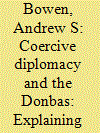

|
|
|
|
|
| Summary/Abstract |
What were Russia’s objectives in Eastern Ukraine, and why was it seemingly unable to achieve a successful or decisive outcome? In contrast to Russia’s seizure of Crimea, the uprising in Eastern Ukraine was marked by disorganization and chaos. Using proxy and surrogate actors, along with military exercises and the injection of Russian troops, Russia sought to institutionalize a political entity inside Ukraine to influence its domestic politics. In this article, I analyze the mechanisms by which Russia attempted to implement, and later salvage, its strategy. The article contributes to clearer theoretical and practical understanding of limited force in coercive diplomacy, signaling, and a more rigorous treatment of the role and uses of proxy actors.
|
|
|
|
|
|
|
|
|
|
|
|
|
|
|
|
| 11 |
ID:
189936
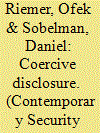

|
|
|
|
|
| Summary/Abstract |
Can intelligence serve as a coercive instrument in international relations? While coercion literature mostly addresses military and economic means, this article argues that coercion can also include the deliberate public disclosure of intelligence. Intelligence can be employed to threaten adversaries, reduce their latitude, and force them to adjust their plans and operations. Additionally, intelligence disclosure can be used to mobilize domestic and international audiences and make others align with a certain narrative and alter their policies accordingly. Still, coercive disclosure can fail or succeed only partially against a determined opponent or a target that is resilient to public and international pressure. To demonstrate the workings of coercive disclosure, we analyze Israel's campaign, beginning in 2017, against the Lebanese Hezbollah’s missile manufacturing program and Turkey's coercive campaign vis-à-vis Saudi Arabia and the United States following Jamal Khashoggi's assassination in 2018.
|
|
|
|
|
|
|
|
|
|
|
|
|
|
|
|
| 12 |
ID:
171053
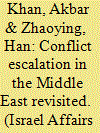

|
|
|
|
|
| Summary/Abstract |
This article argues that state sponsorship of terrorism is a by-product of conflicting relations between states that are generally hostile towards each other. States harbour and drive non-state actors, aiming to create security concerns to the target states, which provoke the target states to take retaliatory actions against the host and/or the terrorist group in a bid to avoid destabilization, uncertainty, and a possible shift in the balance of power between the sponsoring and target state. At this juncture, state sponsorship of terrorism contributes to escalating the conflict. Hence, this type of terrorism should not be treated as a distinct form of violence but as a corollary of interstate rivalries. Iran’s sponsorship of Hezbollah and the Houthis against the backdrop of its rivalry with Israel and Saudi Arabia offers a vivid demonstration of this escalatory dynamic.
|
|
|
|
|
|
|
|
|
|
|
|
|
|
|
|
| 13 |
ID:
170930
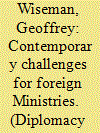

|
|
|
|
|
| Summary/Abstract |
Whilst the diplomatic studies field has grown impressively in the past decade, paradoxically there is much still to be learnt about ‘state foreign services’, a term covering the two sides of the diplomacy coin: diplomats serving at home – in the Foreign Ministry – and abroad – at embassies and consulates. Diplomats have a Janus-faced view of their profession: as envoys abroad and bureaucrats at home. This analysis first assesses the American approach to diplomacy’s two sides, focusing on the impact of the Donald Trump presidency as a benchmark. Flowing from this are several key challenges that bedevil virtually all democratic foreign ministries: How to frame the ‘national interest’? How to represent blemished or populist leaders? How to deal with dissent? How to balance the field-headquarters nexus? And how to manage relations with non-state actors. So long as the Westphalian state system survives, so, too, will the two-sided foreign-service model. Only when moving away from diplomacy as ‘state practice’ to diplomacy as ‘social practice’ can the foreign-service model recede, with diplomacy becoming disintermediated, omnilateral, and post-Westphalian, potentially manifesting radically different practices.
|
|
|
|
|
|
|
|
|
|
|
|
|
|
|
|
| 14 |
ID:
182955
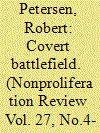

|
|
|
|
|
| Summary/Abstract |
During World War II, the Polish resistance movement used chemical and biological weapons (CBW) against the Third Reich. The use of CBW against the Third Reich most likely originated in a secret Polish biological-weapons program, which existed in the 1930s and went underground after the September 1939 German invasion. Between 1940 and 1942, a unit of the Polish resistance movement named WKZO (Wielkopolskie Kierownictwo Związku Odwetu—the Greater Poland Leadership of the Union of Retaliation) conducted CBW sabotage in the German-annexed area Reichsgau Wartheland and its main city Posen (today’s Poznań). By investigating the use of CBW by the WKZO until its destruction in 1942, it is possible to demonstrate how these weapons were made and used. The article also describes the German reaction, including what defensive measures the German high command took to meet the threat of CBW.
|
|
|
|
|
|
|
|
|
|
|
|
|
|
|
|
| 15 |
ID:
145170
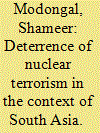

|
|
|
|
|
| Summary/Abstract |
Stability among the great powers during the Cold War is widely theorized in terms of nuclear deterrence. Rationality of States and their preference for survival are the basis of nuclear deterrence. The rationality of non-state terrorist groups is different from that of nation-states. Even though they are also rational actors with their own hierarchy of preferences, survival may not be their ultimate goal. Deterrence of nuclear terrorism is therefore different from deterrence against states. South Asia is more vulnerable to nuclear terrorism than any other region of the world for many reasons. This article analyzes the possibility of nuclear terrorism and the ways of deterrence against it in the context of South Asia.
|
|
|
|
|
|
|
|
|
|
|
|
|
|
|
|
| 16 |
ID:
148354
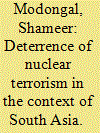

|
|
|
|
|
| Summary/Abstract |
Stability among the great powers during the Cold War is widely theorized in terms of nuclear deterrence. Rationality of states and their preference for survival are the basis of nuclear deterrence. The rationality of non-state terrorist groups is different from that of nation-states. Even though they are also rational actors with their own hierarchy of preferences, survival may not be their ultimate goal. Deterrence of nuclear terrorism is therefore different from deterrence against states. South Asia is more vulnerable to nuclear terrorism than any other region of the world for many reasons. This article analyzes the possibility of nuclear terrorism and the ways of deterrence against it in the context of South Asia.
|
|
|
|
|
|
|
|
|
|
|
|
|
|
|
|
| 17 |
ID:
168616
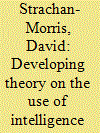

|
|
|
|
|
| Summary/Abstract |
This special section has its origins in the observation that in the intelligence and counterinsurgency literature insurgents tend to be treated as something that intelligence acts upon but rarely, if ever, treated as intelligence actors in their own right. A review of the literature and military doctrine on counterinsurgency highlights this gap and demonstrates the importance of studies such as those brought together in this special section of Intelligence and National Security.
|
|
|
|
|
|
|
|
|
|
|
|
|
|
|
|
| 18 |
ID:
160998
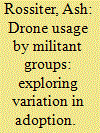

|
|
|
|
|
| Summary/Abstract |
Judging by recent media reporting and pronouncements by senior US military and security officials, the use of drones by militant groups is both reshaping conflict between armed non-state actors and state parties and now presents a grave and direct threat to nations in the West and elsewhere. But does this threat warrant the attention it is currently receiving? To answer this question, this article surveys how various militant groups have used drones both tactically on the battlefield and for wider strategic purposes. Closely examining how drones have been employed and by whom provides a basis for understanding variation in adoption. The article shows how drone usage or non-usage is highly contingent on the setting of the conflict, the aims of different groups, and the capacity of groups to adopt the technology. Though advances in drone technology could make the use-case more appealing for militant groups, drones will be subject to the same back-and-forth, techno-tactical adaptation dynamic between adversaries that have accompanied prior military innovations.
|
|
|
|
|
|
|
|
|
|
|
|
|
|
|
|
| 19 |
ID:
189354
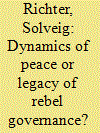

|
|
|
|
|
| Summary/Abstract |
In the academic literature, it is widely accepted that one of the most difficult steps in a peace process is the reincorporation of former combatants. Colombia is a case in point. After the peace agreement with the former rebel group FARC-EP in 2016, the reintegration process of more than 13.000 ex-combatants has been marred with difficulties, be it half-hearted implementation of the stipulations of the accord from the side of the government or the re-armament of some dissident groups. However, the dynamics of the peace process differ considerably between the national and the local level, offering a wide range of pathways from even more violent confrontation up to successful reincorporation projects. In order to explain this variety, we integrate DDR and rebel governance studies and assume that socio-political orders need to be re-configurated when rebel groups have established strong forms of rebel governance, as was the case with the FARC-EP. We argue that patterns of interaction between local conflict-affected communities and ex-combatants are the key explanatory variables for the dynamics of peace processes at local level. We differentiate between clustered and entrenched post-war orders and demonstrate our argument with two case studies based on comprehensive field research.
|
|
|
|
|
|
|
|
|
|
|
|
|
|
|
|
| 20 |
ID:
131982
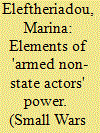

|
|
|
|
|
| Publication |
2014.
|
| Summary/Abstract |
Over the past few years there is an apparent re-regionalization of al-Qaeda activity, intensified by the ongoing Middle East turmoil. Its main characteristic is a trend towards the abandonment of focoist strategies and their replacement by more popular-based ones. This article aims at evaluating their capacity to implement such a strategy shift and sustain the required level of violence. As a means of evaluating this capacity, this article proposes the use of a DIME (diplomatic, informational, military, and economic) framework, which will hopefully provide an alternative angle of theorizing and understanding 'armed non-state actors' (ANSAs). The model is applied in the case of al-Qaeda in the Arabian Peninsula (AQAP), which appears to have effectively developed the military and informational dimensions, due partly to its own prowess and partly to the Yemeni state's weaknesses and the shortcomings of counterinsurgency. In contrast, the economic and diplomatic dimensions suffer from the lack of resources and the anti-systemic nature of AQAP.
|
|
|
|
|
|
|
|
|
|
|
|
|
|
|
|
|
|
|
|
|